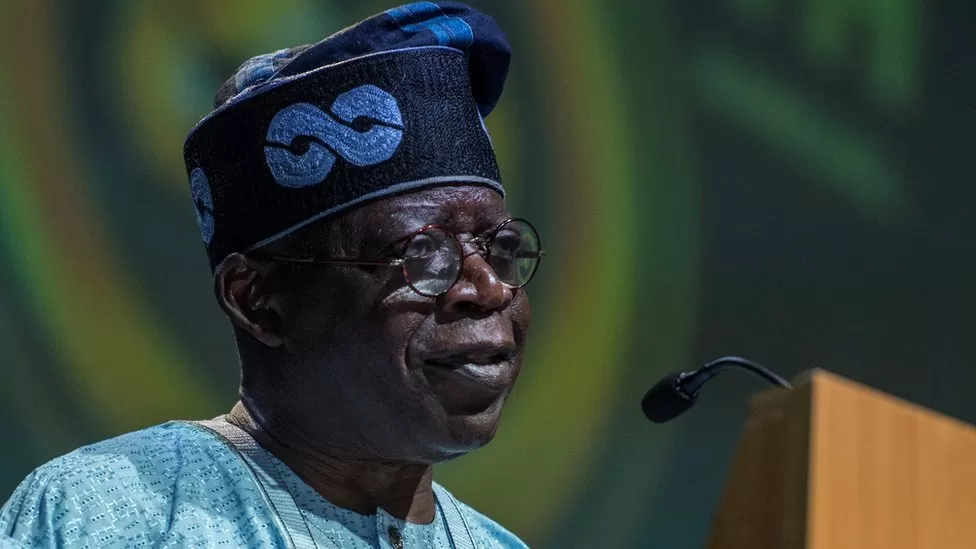BOLA Ahmed Asiwaju Tinubu, 70, has been declared the winner of Nigeria’s most competitive election since the end of military rule in 1999.
Widely credited with reshaping Nigeria’s commercial hub Lagos, Tinubu saw off a divided opposition party and a youth-backed third-party candidate and is set to replace President Muhammadu Buhari in May, unless the opposition claims of manipulation lead to a rerun.
Africa’s most populous country is facing a crumbling economy, widespread insecurity and high inflation. Many will want Tinubu to hit the ground running when he takes on one of Africa’s most daunting jobs.
Once forced into exile by military ruler Sani Abacha, Tinubu knows the value of freedom and wears it as an insignia on his signature hat – a broken shackle that looks like a horizontal figure of eight.
A trained accountant, it was the activities of the pro-democracy National Democratic Coalition (Nadeco) group, where he was a member, that brought him into Abacha’s crosshairs.
The opposition of groups like Nadeco, and Abacha’s death in 1998, ushered in Nigeria’s democracy in 1999 and in many ways, Tinubu, a former Mobil oil executive, feels entitled to Nigeria’s presidency.

Tinubu, known as “Jagaban” by supporters, will now be looking at unifying a country that is retreating into regional lines and religious blocs, as the election results show.
But it is not a job that fazes him. He has pointed to his time as Lagos state governor between 1999 and 2007 to sell his candidacy to Nigerians.
Under his tenure, Lagos massively grew its income through huge foreign investment, while a public transport scheme that saw new lanes created for rapid buses eased the notorious traffic jams faced daily by commuters.

Every governor that has succeeded him has been a protégé following a “grand roadmap”, while one that dared to find his own path was quickly brought to heel, aided by powerful transport union members.

“If I have money, if I like, I give it to the people free of charge, as long as [it’s] not to buy votes,” he said.
In December, he told the BBC that he inherited some real estate which he then invested, but in the past he also said he became an “instant millionaire” while working as an auditor at Deloitte and Touche.

Tinubu also faces questions about his health, once posting an eight-second video of him riding an exercise bike as proof-of-life.
Opponents say his age is catching up with him and point to videos of various gaffes at campaign rallies where it can be hard to understand what he’s saying.
Many Nigerians are wary of another president with health issues after President Umaru Yar’Adua died in office in 2010.
But his supporters say he has the stamina for the job and is not competing for a spot at the Olympics.
During the campaign, there was some controversy about his choice of a running-mate.
Tinubu, a southern Muslim, picked former Borno state governor Kashim Shettima, a northern Muslim, as his vice.
This move was seen as appeasing Nigeria’s Muslim-majority north which has the largest voting bloc in the country.
However, it drew the ire of many Christians who say it went against the tradition of mixed-faith tickets for the presidency.
He defended his choice, saying he went for competence over primordial interests.

He is seen as the political “godfather” of the south-west region and its most influential figure, who decides how power is distributed among his many acolytes.
In 2015 he described describes himself as a “talent hunter” that puts “talents into office”.
His immense political influence led to the merger of opposition parties in 2013 and eventually wrestled power from the then-ruling PDP in 2015 – a rarity in Nigeria where incumbents are not often defeated.
During his party primary, when it looked as though Tinubu’s aspirations were flagging, he reminded Nigerians that he was largely responsible for installing President Muhammadu Buhari after the former military ruler had failed on several occasions to win the presidency.
President Buhari’s associates have since tried to downplay the former governor’s influence in the 2015 election, but it is unlikely that the current president would have emerged, twice, without the backing of Tinubu.
That is why his supporters saw it as a betrayal when Vice-President Yemi Osinbajo, who worked with Tinubu as a commissioner in Lagos, ran against his former boss for the APC ticket.
Having won the election, he will have to tackle many issues left behind by Buhari – widespread insecurity, high unemployment, rising inflation and a country divided along ethnic lines.
It is not an impossible job, but the task ahead is daunting.
BBC AFRICA







